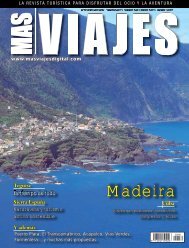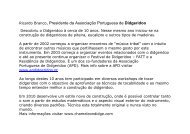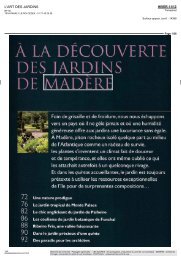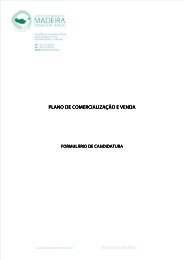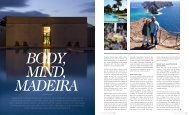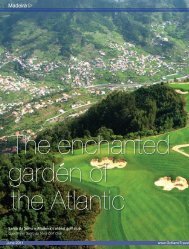Madeira Press Kit - Associação de Promoção da Madeira
Madeira Press Kit - Associação de Promoção da Madeira
Madeira Press Kit - Associação de Promoção da Madeira
You also want an ePaper? Increase the reach of your titles
YUMPU automatically turns print PDFs into web optimized ePapers that Google loves.
It was then granted several contracts with British people who favoured the exportation of<br />
<strong>Ma<strong>de</strong>ira</strong> Wine to England, Occi<strong>de</strong>ntal India and British colonies in America. Since the last<br />
<strong>de</strong>ca<strong>de</strong> of the 17 th century, <strong>Ma<strong>de</strong>ira</strong> knew a new period of economical and cultural<br />
increasing, being its excellent wine responsible for the fame of the Island all over the<br />
world. This prosperity called vineyard cycle had its reflections at arts and architecture.<br />
It was constructed the typical resi<strong>de</strong>nces of the 17 th and 18 th centuries, with its stonework<br />
"bull’s-eye" window, balconies ma<strong>de</strong> with wrought iron, towers, belve<strong>de</strong>res, balconies and<br />
wine press at the ground floor. There is still beautiful examples at Rua dos Ferreiros, do<br />
Bispo, <strong>de</strong> Santa Maria and at some villas on the surroundings of Funchal.<br />
At the same time, we can see the preference of the Baroque and its carved work upon the<br />
Flemish and Mu<strong>de</strong>jar art, in churches, chapels and manor houses. We have chosen as<br />
examples the churches of S. Pedro and the fascinating church of Colégio, at Funchal.<br />
British British presence presence in in <strong>Ma<strong>de</strong>ira</strong> <strong>Ma<strong>de</strong>ira</strong> <strong>Ma<strong>de</strong>ira</strong> was a result of the Napoleonic Wars, a friendly occupation<br />
concluding in 1814. Many British explorers and travellers settled here, originating a strong<br />
community of landowners and tra<strong>de</strong>rs, which together with other nationalities helped<br />
give <strong>Ma<strong>de</strong>ira</strong> a diverse cosmopolitan heritage.<br />
However, since the beginning of the 19 th century first <strong>de</strong>ca<strong>de</strong>, <strong>Ma<strong>de</strong>ira</strong> Archipelago<br />
recognised once again another economical resection, due to the end of the napoleon wars<br />
and the subsequent peace restoration in Europe.<br />
German German U U boats boats shelled Funchal in 1916 and 1917 after Germany <strong>de</strong>clared war on<br />
Portugal, fortunately with few casualties.<br />
With the victory of liberal i<strong>de</strong>as against absolutism, the new <strong>Ma<strong>de</strong>ira</strong> authorities ma<strong>de</strong><br />
economical reformations to fight against the crisis and began constructing the won<strong>de</strong>rful<br />
"leva<strong>da</strong>s" (water canals) of Rabaçal, Juncal, Furado and Fajã dos Vinháticos.<br />
With the irrigation increase, cereal production and other food products increased and<br />
<strong>Ma<strong>de</strong>ira</strong> people became, once again, <strong>de</strong>veloping canebrake plantation and increasing<br />
sugar and banana exportation. At that time, began their <strong>de</strong>velopment of the production<br />
and exportation of the famous <strong>Ma<strong>de</strong>ira</strong> embroi<strong>de</strong>ries and of the typical wickerwork and<br />
baskets.




